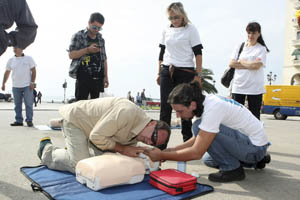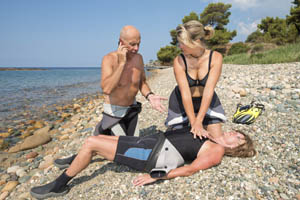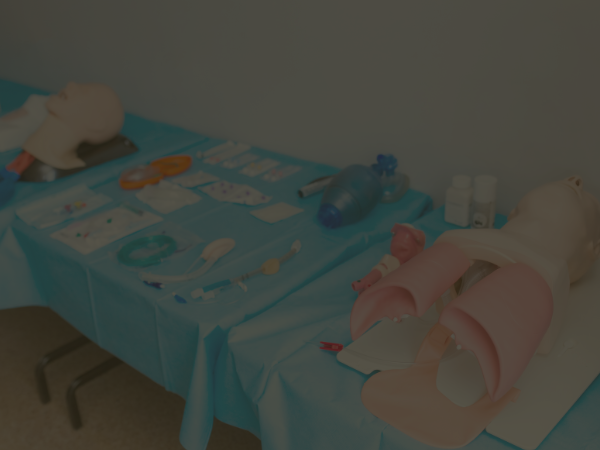SPRING IS IDEAL FOR MANY THINGS. It marks the start of spring and summer sports, and family vacations begin to come together. The days grow longer, and the excitement of nature becomes apparent. However, spring can also be a time of great danger.
The joyous activities of spring and summer open the door to greater risk for injury. Rising temperatures increase the risk of heat-related illness and cardiac arrest.
Since spending spring hidden indoors is impractical, people need to think outside the box, preparing for possible problems, and getting your CPR certification is the perfect solution.
Consider these top reasons why spring is the perfect for becoming CPR certified.
1. Applications for Admission to Fall Nursing Programs Are Due
Prospective nursing students have a mountain of responsibilities to meet in the spring. Chief among them is submitting nursing school applications. Depending on the school, applications to Licensed Practical or Vocational Nurse (LPN or LVN) or Registered Nurse (RN) programs are typically due near the close of spring break or early September for the following semester. In addition, students seeking admission to programs that begin in summer may also apply for late admission in the spring.
For example, Nursing.UTexas.edu notes two deadlines for submission of applications, which may be up to nine months in advance. However, students may consider submitting a late application, provided the school permits such applications. If not, students should use this season as an opportunity to get all application materials ready for the next available submission date.
2. Funds Are More Accessible From Tax Refunds or Tuition Reimbursement
The tax filing deadline is around the corner. Most often April 15, the tax filing deadline is currently Tuesday, April 17, 2018, allowing an extra day to file income tax paperwork due to the Sunday date of April 15.
Although no one looks forward to the paperwork of tax filings, those who may receive a tax refund can use the funds to advance their skillset. For students, available tax credits of up to $2,000, explains H&R Block, may help lessen the financial burden of college. Since a CPR course may not necessarily be available at each school, students should consider using a fraction of their refunds to complete coursework not available at the institution, especially extracurricular courses for career advancement or a given program of study, like CPR certification for prospective nursing students.
3. The Temperature Is Great for Completing Coursework While Spending Time in the Sun
Since winter is finally in retreat, spring will naturally encourage more people to spend time outdoors, but few want to detract from the warmth of the sun by attending an in-person CPR course. This is where completing an online course can be even more beneficial.
Imagine completing the course from a computer or tablet, depending on system requirements, while enjoying the warmth of a spring afternoon. In addition to learning critical, life-saving skills, completing coursework in the sun has the added benefit of helping encourage the body’s natural return to a spring-like circadian rhythm and triggers the release of endorphins, explains the U.S. National Library of Medicine, which have the added benefit of reducing pain, if present. For those still experiencing the sadness or low-mood of the low-light winter months, simply spending time in the sun will brighten their mood, literally.
 4. Cardiac Arrest Risk Increases With Rising Temperatures
4. Cardiac Arrest Risk Increases With Rising Temperatures
Athletes, their parents, friends, and acquaintances also have a reason to consider completing a CPR course in the spring. Athletes may spend more time outdoors in the spring with limited access to water and shade. As explained by USA Today High School Sports, dehydration and overexertion are linked to an increased risk of sudden cardiac arrest in athletes. While additional evidence suggests sudden cardiac arrest may be the result of undiagnosed heart problems, including congenital heart defects, preventing added strain on the cardiovascular system is key to reducing risk. If someone does go into cardiac arrest, performing CPR immediately is crucial to survival.
5. Risk of Automobile Accidents Increases
Warmer weather means more people will be traveling for work, school, or family events, increasing the risk of being in an automobile accident. Furthermore, the time change has an overlooked effect, leading to an increased risk of drowsy driving for those who have not yet adjusted, says Daspit Law Firm.
6. Reviewing Life-Saving Skills Help Prepare for Finals in Healthcare Classes
Preparing for finals signals the close of the spring semester, but, spring is still far from over. Spring technically lasts through the third week of June, ending on the Summer Solstice. While students may still have another month before finals begin in May, those in healthcare-related courses should consider renewing their life-saving skills certifications as a means of preparing for finals.
For example, students completing classes to become an Electrocardiogram (EKG) Monitor Technician will face finals’ questions relating to ventricular tachycardia, bradycardia, and other abnormal heart rhythms. Although these students may not be involved in administering medications as part of acute care life support (ACLS), they act as the first line of defense for nurses, recognizing abnormal heart rhythms when machines fall short.
Even classes teaching basic CPR and AED training can help these students review coursework in advance of finals. Nursing students that have not yet completed ACLS training may consider reviewing their skills through different response scenarios requiring ACLS, like the zero-cost, innovative Megacodes.
 7. Spring Marks the Beginning of Poolside Days
7. Spring Marks the Beginning of Poolside Days
While winter may refuse to go away completely, many parts of the country are already experiencing above-average temperatures. In fact, the temperature in windy, dusty West Texas was 20-degrees above average for the first part of April, accompanied by a surprise late-night freeze. Regardless of night-time temperatures, warmer days will attract people to the water.
Unfortunately, spending time at the pool can quickly turn into a deadly situation. According to the Centers for Disease Control and Prevention, 10 people drown each day, but fast-action could save someone’s life.
People can drown in mere inches of water, and saving a drowning victim requires CPR. If a pulse is not present, chest compressions must be delivered. If the person is not breathing, he needs rescue breaths. Even those who know how to swim could become the victim of accident, requiring life-saving measures. Moreover, people with sensitivities to chlorine and pool-cleaning chemicals may be more likely to suffer an allergic reaction.
In addition, pools that have not been maintained may contain potentially hazardous bacteria, which could result in an array of health problems, up to and including cardiac arrest or other life-threatening issues, says Latham Pool. Also, spending time in the hot tub, perfect for those cooler spring nights, can open the door to serious health problems, reports Good Housekeeping, including Legionnaire’s disease, resulting in pneumonia and acute respiratory failure.
8. Allergens Return With Vengeance
Speaking of people with sensitivities to chemicals brings another reason for renewing or becoming CPR certified in spring; increased insect activity and spring cleaning can present harmful allergens that could result in a severe allergic reaction, anaphylactic shock. In addition, those with a history of allergic reactions that did not result in anaphylaxis have a higher risk of going into anaphylactic shock upon subsequent exposure to the allergen, reports MayoClinic.org.
Those with a history of severe allergies should be extra mindful of using new cleaning products or engaging in other spring-related activities. This includes when visiting a new restaurant or location that has opened for the spring, spending time around fresh paint, and spending time outdoors. Think of people with allergies that are often overlooked. It is not just food allergies that present a risk, so being prepared to provide life-saving measures can literally mean the difference between life and death in the allergen-laden season.
Allergies also affect prospective nursing students who may just be entering healthcare facilities for the first time. As explained by the American Academy of Allergy, Asthma and Immunology (AAAAI), new materials designed to replace latex gloves may still trigger a reaction in those with latex allergies. Furthermore, some may have never come into contact with latex before, and initial exposure to latex gloves could trigger a severe allergic response.
9. Employers May Favor Applicants With CPR Certification
Completing a CPR course is not only beneficial to students seeking admission to nursing programs; it can be key to students, adolescents, and adults interesting in starting a new career outside of the healthcare field too.
Employers may favor applicants who demonstrate a willingness to be prepared for any possibility, regardless the field. In restaurants, an ordinary day at work can become a life-threatening situation. Fires, falls, and other risks exist. Childcare facilities, restauranteurs, and entrepreneurs want applicants that know how to handle all situations, including those that may be outside of their basic job description, like providing emergency help to a coworker, a customer, or a client.
Since spring heralds a rise in the number of available jobs, especially those outdoors, becoming CPR certified may help with landing a follow-up interview and getting a dream job. Of course, those interested in careers requiring CPR certification for employment, like working as a certified nurse’s assistant (CNA), will need to obtain their certifications before working, and since such careers have a major impact on the attractiveness of nursing school applications, the reason for getting CPR certified in the spring is amplified.
10. Students Have More Free Time to Complete Extracurricular Coursework
Depending on the specific schedule of your school, spring break may take place anytime between February and the end of April. Those in year-round schools may be more likely to have spring break scheduled for later in the semester, providing an extra period of rest before finals. While students should take a few days off to recuperate, spring break off-days offer an excellent opportunity for completing extracurricular coursework, like renewing your CPR or BLS certification.
Instead of spending the evening engaging in risky behaviors, think about productive ways to spend your free time, and pausing from existing schoolwork for a few hours to complete your certification may help prevent information overload, the mental fatigue that accompanies spending extra hours studying.
It may seem counterintuitive, but focusing on a different topic for a temporary period may help with committing important facts to memory.
Plan for a Safe and Enjoyable Spring Season by Getting Your CPR Now
Spring is supposed to be an enjoyable season, but it carries distinct risks for injuries, accidents, and unforeseen health problems. Rather than hoping for the best, know the risks, and prepare by getting your certifications in order today.
Join the conversation by sharing this post to your social media pages, and don’t forget to sign up for your life-saving skills course now. If you already have your ACLS certification, put your skills to the test with our new Megacodes practice scenarios, which are available online.







Leave a Reply